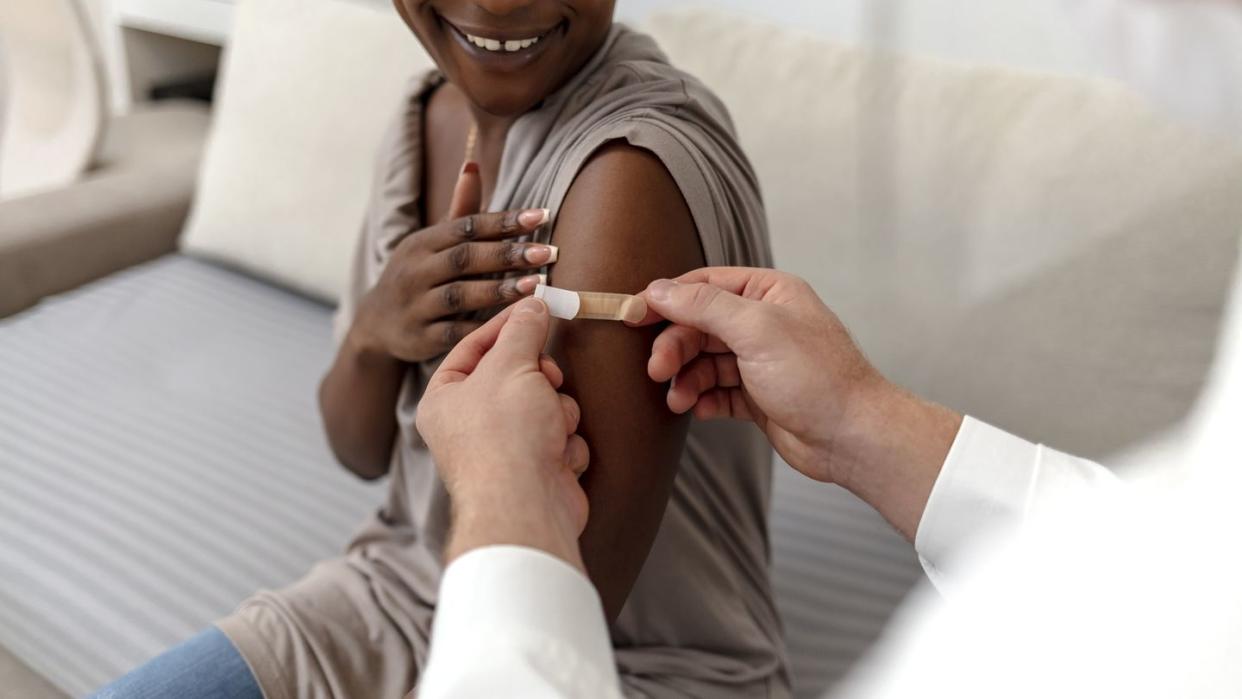Doctors Reveal the Exact Time You Should Get Your Flu Shot

"Hearst Magazines and Yahoo may earn commission or revenue on some items through these links."
Getting a flu shot might be trending pretty low on your to-do list this fall – after all, it’s just the flu, right? No big deal! Think again.
“I'd never gotten the flu before, and wasn’t vaccinated against it,” says Kathryn A. Boling, MD, a primary care doctor at Mercy Medical Center in Baltimore. “Then I did get it – and it laid me up! I was so ill for two weeks. With the flu, you can never really know for sure who is going to get super-sick.”
During last year's flu season, 9 million Americans were estimated to have gotten the virus. But the flu shot can help prevent you from becoming a statistic, and having to take time out of life to deal with symptoms like headache, cough, fatigue, weakness, sore throat, runny, stuffy nose and eye pain. “It’s highly recommended that you receive a flu shot in order to prevent getting infected or transmitting the virus, and to reduce the severity of infection," says Paunel Vukasinov, MD, an internal medicine specialist at Medical Offices of Manhattan in New York City.
It's true that you can still catch influenza even if you've been vaccinated against it, but your chances are lower than if you didn't get jabbed: The flu vaccine typically offers between 40% and 60% protection against getting infected, according to the Centers for Disease Control and Prevention. And while these numbers can fluctuate depending on which flu viruses are circulating, the seasonal shots are formulated to be as close to the projected current viruses as possible, so "the composition of the vaccine was updated in this year's shot to reflect the most likely circulating strains,” explains Dr. Vukasinov.
Here's everything you need to know about how to get a flu shot, what to expect after getting it and whether or not you should get all three vaccines to protect against the "tripledemic"(the flu, COVID-19 and RSV) that experts say we can expect this cold and flu season.
When should I get a flu shot?
Timing your shot correctly is important — you ideally want to be sure you're protected before the height of cold and flu season because it takes a little time for your body to build up antibodies that will help fight off the virus. “It takes up to two weeks after getting a flu shot to be fully protected,” says Dr. Boling. “I’m telling my patients to get their flu shots during the month of October, so they are fully protected by November." But you also don't want to get this protective jab too early. "Last year, pharmacies had the shot available in July and August, and some of my patients who got their shots that early were coming to see me in April and May, sick with the flu, because their protection had worn off,” Dr. Boling adds.
Never get a flu shot while you're actively sick or have a fever, or if you know you've recently been around someone who was sick with the flu. “If you've been exposed to the flu and get your flu shot right afterward, there's a chance your symptoms may make you feel sicker, and in that instance, you should definitely be seen by your healthcare provider,” says Dr. Boling. Once you feel better or a little time has passed since your exposure, then you can get jabbed.

Is it ever too late to get one?
Any time during cold and flu season technically works, but “usually sooner is better, in order for your body to have time and make a robust immune response,” says Dr. Vukasinov. But even if you miss the October window, it's still worth getting a flu shot to protect you through the rest of winter.
Where can I get a flu shot?
Make an appointment with your healthcare provider, or head to your local pharmacy or urgent care clinic. Drug store chains like CVS and Walgreens offer low or no-cost flu shots with many insurance plans. Getting a shot is really easy–you can schedule an appointment online, or often just walk in.
Who is most at risk for the flu?
Certain factors can heighten your susceptibility to catching or getting a more severe case of the flu. “High risk groups include pregnant women, children younger than five years old (especially those under age two), adults age 50 and over (and particularly past age 65), and individuals with chronic conditions such as diabetes, asthma, lung disease, kidney or liver disease, and those with a compromised immune system,” says Dr. Vukasinov.
The flu can become deadly if it leads to pneumonia or a brain infection called encephalitis, so while people shouldn't panic, those in high risk groups should be especially vigilant in getting jabbed against it, Dr. Boling adds.
Can I get a flu shot if I'm pregnant?
Yes — the flu shot is safe for pregnant women in any trimester, and "it also protects your baby because women who get the flu vaccine while pregnant or breastfeeding can pass those antibodies that they develop to their babies," Dr. Vukasinov says. But there's one important note: pregnant women should be sure to confirm with their vaccinator that they're not receiving a vaccine with a live virus in it (LAIV or nasal spray).
What side effects can I expect after getting the flu shot?
Some people don't experience any side effects beyond a sore, red arm, says Dr. Vukasinov, but others may get flu-like symptoms such as headache, fatigue or fever; most side effects will happen within 24 to 48 hours of getting vaccinated and go away on their own.
However, if your symptoms seem to be getting worse, give your doctor a call. The reason is twofold: You want to make sure you aren’t having a serious reaction to the shot (so, so rare, but still possible), and you also want to check to make sure you aren't having complications related to the flu itself if the virus managed to infiltrate you right before you got jabbed. Signs of a serious reaction to the flu vaccine include trouble breathing, hoarseness, paleness, dizziness and hives, but again, very few people experience this.
Can I get a flu shot at the same time as my COVID-19 booster and/or an RSV vaccine?
When it comes to the COVID booster, always ask your doctor first, but the answer will most likely be "yes." There's a possibility that you may be likelier to experience side effects if you double up — a CDC study published last summer found that people who got a flu vaccine and an mRNA COVID-19 booster vaccine at the same time were slightly more likely (8% to 11%) to have reactions including fatigue, headache, and muscle ache than people who only got a COVID-19 mRNA booster vaccine — but these reactions were mostly mild and went away quickly, so that's not a reason to reject one or the other if your doctor signs off, Dr. Vukasinov points out.
If your doctor has recommended you get an RSV vaccine, too, you might want to split up these two jabs and get your flu shot at a different time. While it's safe to receive the two simultaneously, "there's some thought that co-administration of flu and RSV vaccines may make your antibodies somewhat lower, so I recommend spacing your flu shot and RSV shot out about two weeks apart."
You Might Also Like

